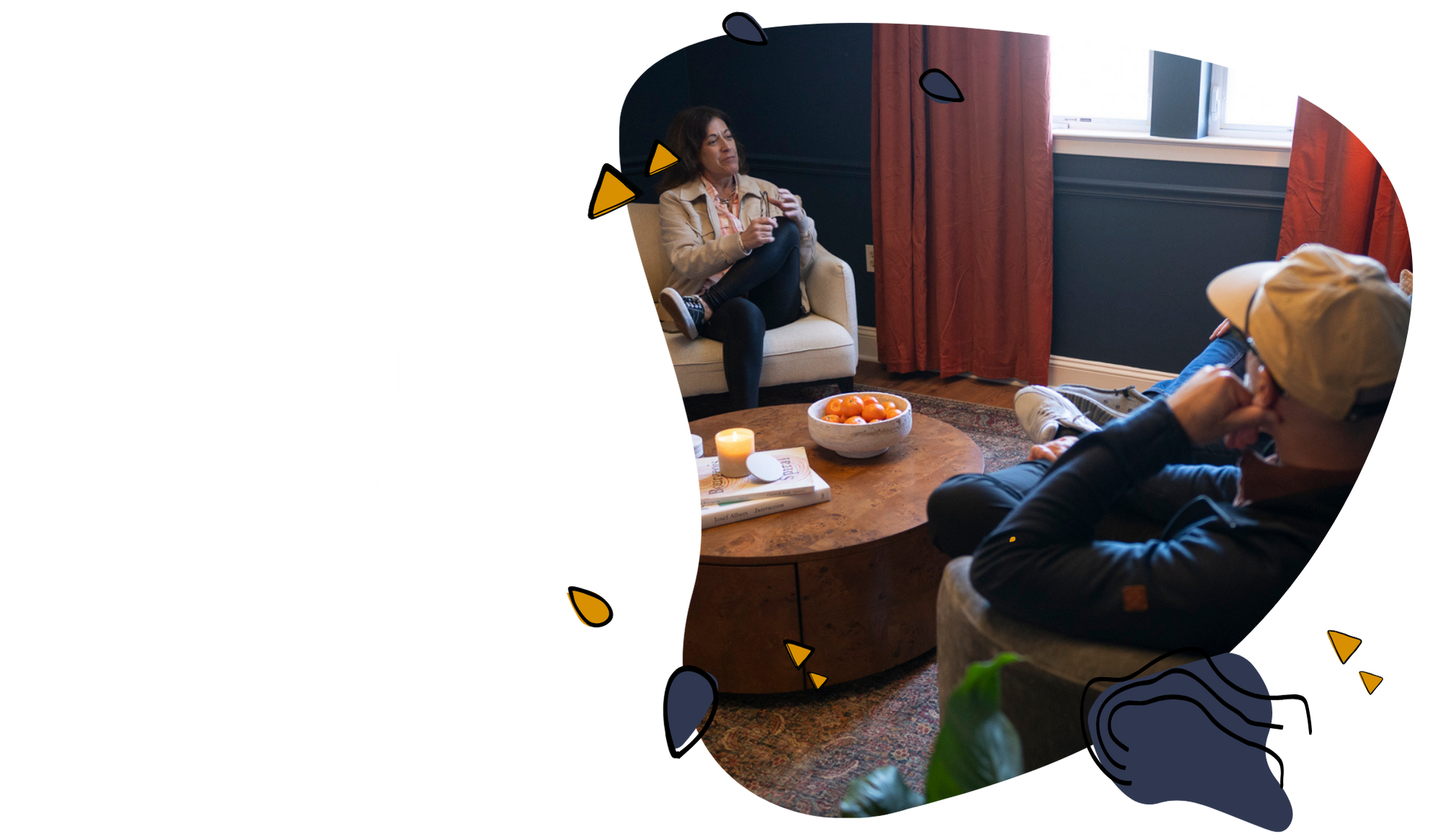Therapy and Counseling for Women
Being a woman of any age comes with its own challenges. Whether it’s trying to meet work and school deadlines, deal with unrealistic standards and expectations, or keep the family fed and alive. We carry the weight of judgment every day. People are quick to have opinions about our bodies, our choices, our parenting, our aging, and even how we show (or don’t show) our emotions —without pausing to understand our stories. The good news is, at GIA, we get it, and we can help.
Common Reasons Women Seek Therapy
Anxiety (excessive worrying, ocd, panic)
‘Adulting’
Balancing careers, family, and self-care
Body Image
Co-parenting
Dating, heartbreak, and finding your way after breakups
Divorce
Depression or isolation
Disordered eating
Fertility Challenges
Grief and loss (death, divorce, career, etc.)
Identity loss or change
Infidelity
Menopause
Pressure to look, act, or “be” a certain way
Postpartum depression
Parenting challenges
Major life transitions (promotion, motherhood, aging)
Stress
Self-esteem
Relationship conflict
Sexual abuse or abusive relationships
No matter your reason, we are here to help
While there is no “one-size-fits all” therapy, women often benefit from therapies that are relational, skills-based, and tailored to your unique experiences.
Top Therapy Modalities for Women
-

DBT (Dialectical Behavior Therapy)
DBT (Dialectical Behavior Therapy) is very effective for those who struggle to regulate intense emotions, combining mindfulness, emotional regulation, distress tolerance, and interpersonal effectiveness skills. CBT (Cognitive Behavioral Therapy), from which DBT is an offshoot of, helps identify and reframe unhelpful thought patterns, making it useful for treating anxiety, depression, and stress.
-

Relational Psychotherapy
Relational Psychotherapy can help undo the effects of past trauma from relationships by recognizing patterns when they become enacted, identifying the ramifications of old patterns, and practicing new ways of relating to ourselves and others. Internal Family Systems (IFS), a form of relational psychotherapy, is also a helpful approach for many women. It allows us to explore the different “parts” of ourselves—the vulnerable, critical, and protective parts—and understand how these parts shape our emotions and behavior.
How Women Benefit from Therapy
Therapy can benefit anyone, but women often carry the weight of heavy responsibilities and expectations, especially when it comes to juggling work, societal pressures, biological changes, and family needs. And any loss, trauma, or extra challenges experienced by LGBTQ or BIPOC women doesn’t help. We often feel the need to just smile, assure others we’re fine, and quietly struggle alone. That load can be overwhelming to hold alone. Therapy at GIA can provide a safe space to learn how to lighten your load, build stronger connections, feel more balanced, and show up for life as your true self. Here are some ways women have benefited from our counseling and therapy sessions:
1. Healing Past Trauma
Therapy offers a tranquil space to heal old wounds from abuse, neglect, and unhealthy relationships. Many women find themselves feeling more at peace with their past, discovering their voice, and uncovering the best parts of who they are. It’s about learning how to feel free to be you.
2. Confidence, Body Image, and Identity
So many women feel pressure to look, act, or “be” a certain way. In therapy, you can learn to resist those expectations, feel more comfortable in your own skin, have and express sexual needs more, and develop healthier relationships with your body. Aging, motherhood, or life transitions don’t have to define your worth, rather you get to make your own choices and embrace life on your terms.
3. Strengthening Relationships by Being YOU
Whether it’s navigating the ups and downs of dating, managing relationships with colleagues, putting a marriage back together, or creating stronger boundaries with friends and family, therapy with a GIA clinician helps women build healthier, more fulfilling relationships. You can learn to parent with more balance, feel less guilt, strengthen your connection with your children and your own parents, while also making space for yourself.
4. Stress and Anxiety Management
From career pressure and workplace dynamics to juggling school drop-offs and while keeping everyone fed and alive, stress and overwhelm takes a toll on us. Therapy gives women tools to manage stress and overwhelm. Together, we can reset your nervous system, find creative, effective solutions to everyday challenges, reduce excessive worry or panic, and help you feel more grounded and capable through it all.
5. Growth and Self-Confidence
Therapy isn’t only about getting through hard times, it’s also about creating a more joyful, meaningful life. You can learn to navigate grief and loss without getting stuck, adjust to life transitions with resilience, enjoy sex and intimacy more fully, and discover how to bring more joy and fulfillment into each day. Take control of your life with confidence and watch your relationships and your home flourish.

Our Approach
Gina M. Innocente, founder of G.I.A. Institute, built this practice with a vision: to be a safe space where folks can show up exactly as they are and feel safe, understood, and cared for. For many women, walking into G.I.A. feels like stepping into their own vision of what healing should be: calm, refined, and restorative.
Over the years, our clients and community have come to trust us –not just as highly-trained experts, but as real people who bring our compassion, intelligence, and authenticity into our work. Women especially find comfort leaning on our expertise while feeling a genuine connection and relatability.
One of our goals is to be especially mindful of all people–including women, people of color, members of the LGBTQ+ community, and people from diverse backgrounds and beliefs. No matter who you are, your story is heard, your struggles are validated, and your healing matters.
What To Expect At G.I.A. Institute
-

We're your therapists next door, ready to help you reset your relationships and rewrite your story.
-

We are excited to meet you and get to work understanding your goals for our sessions and your life.
Frequently Asked Questions
-
While friends can listen and support, therapy offers a professional relationship guided by training, proven methods, and a safe space designed for healing and growth.
Make an Appointment -
Yes. We provide sensitive, supportive therapy for women navigating fertility struggles, pregnancy loss, and the complex emotions that come with these experiences.
-
Therapies like EMDR, trauma-informed approaches, and relational therapy can be very effective in processing and healing from sexual abuse. Your therapist will work with you to find the right approach for your needs.
-
Yes. Therapy can help couples improve communication, rebuild trust, and strengthen emotional connection, especially during times of stress or conflict. It also doesn’t always “take two to tango.” Many find as you improve your own communication and well-being, your spouse softens and improves as well.
-
If you’re feeling stuck, overwhelmed, or unable to cope, therapy can help. You don’t need to wait for a crisis—many people benefit from therapy simply as a space for growth and support. Many couples also come in before marriage to discuss expectations about things that often lead to problems down the road–things like values on parenting, in-law relationships, finances or religion.
-
If you would like to meet with one of our therapists, the first step is to fill out our new client inquiry form. Once we receive this form, we will contact you to schedule a brief intake consultation with our clinical director to help you connect with the right therapist. If you have questions, feel free to contact us by calling 609-788-0771 or sending an email to info@ginnocente.com.
Ready to Rewrite Your Story?
Let’s get to know each other and schedule our first session together to take back your life!



